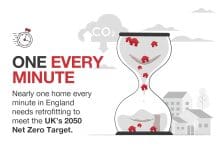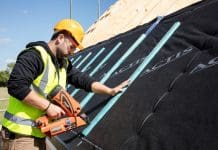Kevin Bohea, President of the British Rigid Urethane Foam Manufacturers Association (BRUFMA) examines the challenges ahead for energy efficiency policy
Energy efficiency has long been a government policy consideration to reduce energy demand, lower household bills and reduce carbon emissions in a cost-effective manner.
At BRUFMA, we believe that buildings should be at the heart of energy policy. We promote a ‘fabric first’ approach to energy efficiency which ensures that a thermally insulated building envelope delivers high performance, low maintenance, reduced energy bills and long-term energy efficiency.
However, we also recognise that for policy makers getting this approach right can be a significant challenge. For example, the last policy cycle for the Energy Company Obligation (ECO), was not heralded as a success due to the many policy changes that created market uncertainty and issues with measures not always reaching those most in need such as fuel-poor households.
ECO consultation
The proposals in the recent ECO consultation seek to tackle these issues and notably the transition period for the scheme (2017-2018) and the next cycle (2018-2022) will seek to target more fuel-poor households. This is a positive approach to the deployment of funding. Reaching more vulnerable households can have a myriad of benefits, not only to reduce bills and carbon emissions but also the improved health and wellbeing of living in a warm home. Some types of insulation also have flood resistant qualities which could benefit communities living in flood prone areas. With the government also in the process of delivering a new Infrastructure Strategy which aims to foster economic growth and improve the quality of life in the UK, the link between cross-departmental goals has never been more important.
The solid wall minimum proposed in the ECO consultation is an important part of achieving these objectives with many fuel-poor households living in solid wall homes. Consequently, in its consultation response, BRUFMA has pressed for the minimum to be set at a higher level than the equivalent of 17,000 installations per year as proposed in the consultation. For example, a more appropriate minimum would be 25,000 solid wall insulation measures per year equivalent to the average installed per year in the second phase of the scheme; this would also be more in line with recommendations by the Committee on Climate Change.

In deploying more support targeted at fuel-poor households, it is important not to forget the remaining householders often referred to as the ‘able-to-pay’ sector. Where energy efficiency measures can pay back relatively quickly, government and industry must support consumers and private investment with the information and appropriate incentive to install these. Currently, lack of information on what energy efficiency improvements are available and the significant benefits these measures can bring is acting as a barrier to installation.
Our members, which comprise about 50% of the UK’s thermal insulation market, are aware, through experience, of a number of trigger points at which householders may be more likely to install measures and experience less disruption. For example, at the same time as moving house or making any significant home improvements is a prime time to also install energy efficiency measures. As such, BRUFMA members have a strong interest in the possibility of linking improvements to the energy efficiency of a home, based on EPC information, to the mortgage offer or stamp duty. Similarly, we would strongly support a mandate in building regulations for energy efficiency measures at relevant points of home renovation such as an extension or loft conversion.
Naturally, policymakers are cautious of measures which may appear more disruptive and in particular more costly. Therefore the availability of information is crucial to gain support and understanding from consumers; particularly where payback is often very short in time and costs saved are higher in the long term than relative installation cost.
BRUFMA recently shared a paper with policy stakeholders which summarised our thoughts on the above issues and made three clear recommendations for support in the sector. In particular, our members would support an increased threshold for solid wall insulation under ECO and a framework for support in the ‘able-to-pay’ sector. Another important area we would like to see more activity is on product quality and installation standards. Quality should be at the forefront of energy efficiency policy, and high standards will ensure that the industry is trusted by consumers. Related to this is the need to address skills and standards across the construction sector.
In the coming year, BRUFMA will be addressing these and other issues in the sector and look forward to engaging with policy makers as long-term plans for energy efficiency are developed.
Kevin Bohea
President
British Rigid Urethane Foam Manufacturers Association (BRUFMA)














